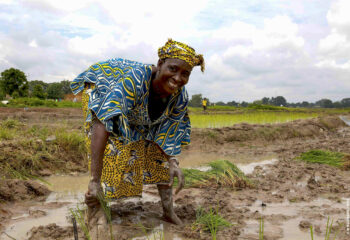Traditionally, reaching a historical landmark evokes a desire to examine the successes of one’s past and causes one to look forward to equally meaningful endeavors in the future. Such is the case as I look back over IFDC’s 40 years of service in efforts to achieve global food security while enhancing the lives of billions of smallholder farmers.
Upon its birth in 1974, IFDC held firmly to its mission to continue the development of new fertilizer and agricultural production technologies championed by the National Fertilizer Development Center (NFDC) in previous decades under the United States’ Tennessee Valley Authority. Early IFDC efforts focused in Latin America and Asia, particularly to evaluate the effectiveness of direct application of phosphate rock and address low nitrogen use efficiency in rice production, respectively. In less than two decades, many of these developing nations became food secure. From there, IFDC’s influence and interventions spread nearly the world over – Eastern Europe and Africa – teaching best agricultural practices, providing access to new fertilizer technologies and providing technical assistance to private industry.
Evolution has been an IFDC mantra throughout its history, and transformation has led the Center to grow beyond fertilizer development and technology transfer to something altogether greater in its depth and scope. Today, the Center is a renowned expert in creating and enhancing national and regional inputs supply chains and linking smallholder farmers to well-functioning and profitable output markets. IFDC has developed robust expertise in building agriculture related economies in emerging markets – all the while focusing on plant nutrient management, pro-agriculture policy, public-private partnerships and professionalizing smallholder farmers.
But in the midst of these achievements, we must resolve to contemplate the future of food security. The challenges are greater than ever, and the stakes grow higher with each passing year. IFDC believes that innovation will write the next chapter of this story. Advances in fertilizer technology will be critical in the quest to feed nearly 10 billion people by 2050. We are at a unique point in history, much like the industrial revolution of the mid-1800s, where we have – or soon will have – the tools to protect the environment, to resist and react to climate change, to increase nutrient use efficiency and to improve human health.
Over the next few months, we will commemorate the Center’s accomplishments by taking time to explore our evolution throughout each decade. We will also explore several of the issues and opportunities that we face in future development efforts. I hope that this will not only be an engaging historical review but also an inspiration for future work by IFDC and others in international agricultural development.
–Dr. Amit Roy, IFDC president and CEO




